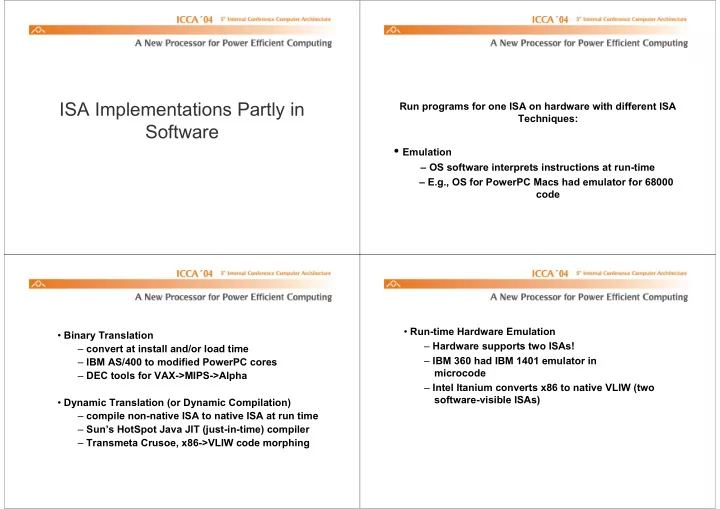

ISA Implementations Partly in Run programs for one ISA on hardware with different ISA Techniques: Software • Emulation – OS software interprets instructions at run-time – E.g., OS for PowerPC Macs had emulator for 68000 code • Run-time Hardware Emulation • Binary Translation – Hardware supports two ISAs! – convert at install and/or load time – IBM 360 had IBM 1401 emulator in – IBM AS/400 to modified PowerPC cores microcode – DEC tools for VAX->MIPS->Alpha – Intel Itanium converts x86 to native VLIW (two software-visible ISAs) • Dynamic Translation (or Dynamic Compilation) – compile non-native ISA to native ISA at run time – Sun’s HotSpot Java JIT (just-in-time) compiler – Transmeta Crusoe, x86->VLIW code morphing
Dynamic Translation • Tradeoff between optimizer run-time and time saved by optimizations in translated code • Technique used in Java JIT compilers • Translate code sequences as needed at run-time, but cache results. • Also, Transmeta Crusoe for x86 emulation • Can optimize code sequences based on dynamic information (e.g., branch targets encountered). Transmeta Translation Transmeta Crusoe • Converts x86 ISA into internal native VLIW format x86 code: using software at run-time ->Code Morphing” addl %eax, (%esp) # load data from stack, add to eax • Translations cached to avoid translator overhead on addl %ebx, (%esp) # load data from stack, repeated execution add to ebx movl %esi, (%ebp) # load esi from memory • Completely invisible to operating system – looks subl %ecx, 5 # sub 5 from ecx like x86 hardware processor
first step, translate into RISC ops: Compiler Optimizations ld %r30, [%esp] # load from stack into temp add.c %eax, %eax, %r30 # add to %eax, set Optimize: cond.codes ld %r30, [%esp] # load from stack only once ld %r31, [%esp] add %eax, %eax, %r30 add.c %ebx, %ebx, %r31 add %ebx, %ebx, %r30 # reuse data loaded earlier ld %esi, [%ebp] ld %esi, [%ebp] sub.c %ecx, %ecx, 5 sub.c %ecx, %ecx, 5 # only this cond. code needed Scheduling Schedule into VLIW code: ld %r30, [%esp]; sub.c %ecx, %ecx, 5 ld %esi, [%ebp]; add %eax, %eax, %r30; add %ebx, %ebx,%r30
Recommend
More recommend